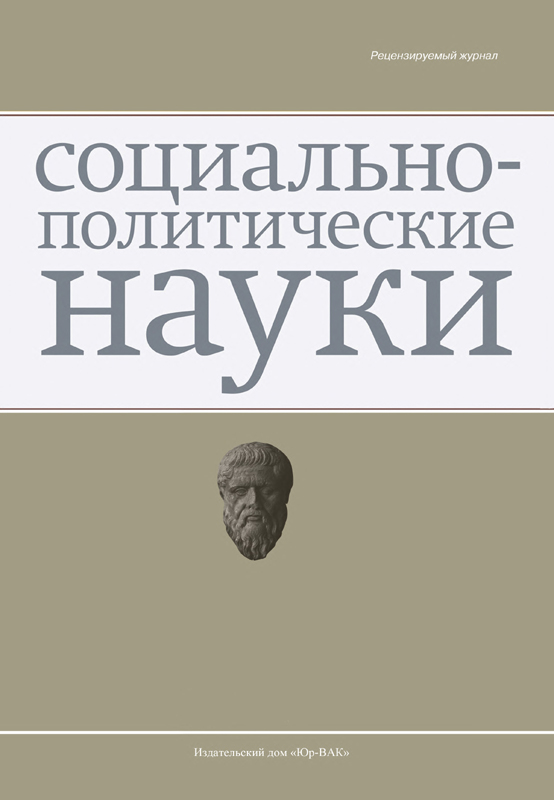Political Modernization in Traditional Societies (by the Example of the North Caucasus)
- Authors: Borokova I.D.1
-
Affiliations:
- North Caucasus State Academy
- Issue: Vol 13, No 1 (2023)
- Pages: 45-51
- Section: Political Institutions, Processes and Technologies
- URL: https://journals.eco-vector.com/2223-0092/article/view/545865
- DOI: https://doi.org/10.33693/2223-0092-2023-13-1-45-51
- ID: 545865
Cite item
Abstract
The purpose of the article is to identify and analyze the features of political modernization in traditional societies on the example of the North Caucasus. The main attention is paid to contradictions and factors that generate crises of political modernization. The conditions of the modernization process, the structural components of traditional societies are revealed, the types of crises accompanying the modernization process are characterized, the factors that determine the success of modernization in transforming societies are analyzed. This article also attempts to delve into the essence of the specifics of political modernization in the North Caucasus. The author examines the problem of modernization through the prism of political, socio-economic, cultural and other features of the region, which are deeply interconnected and have common roots. The author concludes that the success of democratic transit depends on the presence in society of a mature social base, structured civil society institutions, an effective multiparty system, which, due to various circumstances, have not developed in the North Caucasus. An equally important factor hindering modernization in this region is the polyethnicity and multi-confessional society characteristic of the North Caucasus. Religion, which has a fairly strong position in the region, has a significant influence on political processes. The article also examines the role of ethnic elites, whose activities determine the specifics of relations in society.
Full Text
About the authors
Inna D. Borokova
North Caucasus State Academy
Author for correspondence.
Email: borokova1972@mail.ru
ORCID iD: 0000-0002-1729-512X
senior lecturer at the Department of Humanities
Russian Federation, CherkesskReferences
- Anchabadze Y.D. From the compiler. In: The peoples of the Caucasus: Ethnocultural traditions and modernization. Scientific collection dedicated to the memory of G.A. Sergeev. Yu.A. Anchabadze (comp., ed.). Moscow: Three Squares, 2016. Pp. 5–7.
- Gadieva A.N., Kulova M.R. In Geopolitical challenges and economic risks in the North Caucasus and Federal District. Kavkaz-Forum. 2022. No. 9 (16). Pp. 118–126. (In Rus.)
- Gadzhiev M.M. Features of interaction of political, ethnic and religious factors in the North Caucasus. Caspian Region: Politics, Economy, Culture. 2021. No. 2 (67). Pp. 103–108. (In Rus.)
- Dalakov Z.N. Formation and institutionalization of actors of the political process in the North Caucasus in the post-Soviet period. In: Humanitarian and socio-political problems of modernization of the Caucasus. Collection of articles in the VIII International Conference. Pyatigorsk: LLC “KEP”, 2020. Pp. 75–82.
- Darchieva S.V. Russia in the Late Imperial period: Regional aspects of political modernization (on the example of the North Caucasus). Power. 2019. Vol. 27. No. 5. Pp. 227–231. (In Rus.)
- Dzhanteeva D.S. Political and communicative processes in the North Caucasus: expert assessments of problematic aspects. Theories and Problems of Political Research. 2017. Vol. 6. No. 2A. Pp. 444–453. (In Rus.)
- Erokhin A.M., Vorobyev S.M., Avdeev E.A. Conflictogenic potential of ethnopolitical processes in the North Caucasus. Izvestiya Yugo-Zapadnogo gosudarstvennogo universiteta. Series: History and Law. 2019. Vol. 9. No. 5. Pp. 123–133. (In Rus.)
- Ivashchenko A.S. The influence of the ethnic factor on political and socio-economic processes in the North Caucasus (1990s-early twentieth century). Voice of the Past. 2016. No. 3-4. Pp. 183–192. (In Rus.)
- Kerimov A.A. The political process in modern Russia: features and prospects. In: Topical issues of social sciences: Sociology, political science, philosophy, history. Collection of articles based on the materials of the XVIII scientific and practical International conference. Novosibirsk: SibAK, 2012. Pp. 7–14.
- Kerimov A.A., Kabaziev M.S. The ethnic component of the political identity of modern Kazakhstan. Bulletin of the Voronezh State University. Series: History. Political Science. Sociology. 2022. No. 4. Pp. 42–45. (In Rus.)
- Kubanov S.K. Political dynamics of the North Caucasian traditional society. Socio-Humanitarian Knowledge. 2011. No. 8. Pp. 344–349. (In Rus.)
- Salgiriev A.R. Technologies of political management in the context of regional political processes in the North Caucasus. Izvestiya Saratov University. A New Series. Series: Sociology. Political Science. 2015. Vol. 15. No. 3. Pp. 99–102. (In Rus.)
- Sarkarova D.S. Some features of the political modernization of the republics of the North Caucasus. Higher Education Today. 2017. No. 9. Pp. 54–57. (In Rus.)
- Suleymanova S.S. The political process in the North Caucasus: Problems and contradictions. Questions of Political Science. 2011. No. 4 (4). Pp. 120–129. (In Rus.)
- Ebzeev A.A. Globalizing factors of political transformation processes in the North Caucasus. Socio-Humanitarian Knowledge. 2012. No. 9. Pp. 73–81. (In Rus.)
- Avdeev A.E., Vorobev S.M. Value basis of social identity in the consciousness of youth from multiethnic regions: The case of the North Caucasus. Journal of Siberian Federal University. Humanities & Social Sciences. 2022. № 15 (9). Pp.1230–1242.
- Lipset S.M. Some social requisites of democracy: Economic development and political legitimacy. American Political Science Rev. 1959. Vol. 53. No. 1. Pp. 69–105.
Supplementary files









